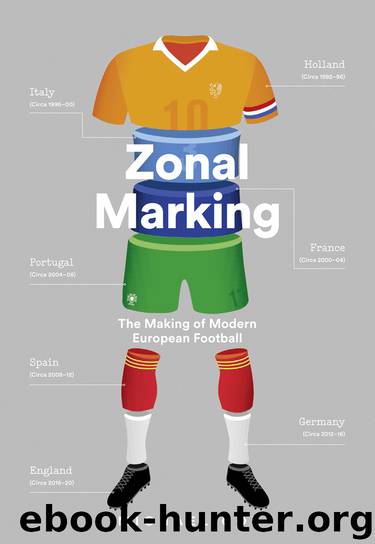Zonal Marking by Michael Cox

Author:Michael Cox
Language: eng
Format: epub, azw3
Publisher: HarperCollins Publishers
Published: 2019-04-14T22:34:54+00:00
12
Wingers
Foolproof confirmation that a country possesses a defined footballing identity is the existence of a well-worn cliché for their national side. Ahead of a major international tournament, TV pundits are often forced to talk about national sides they haven’t watched over the previous two – or four – years, but they can nevertheless always fall back on the old caricatures.
So, just as Italy were always ‘slow starters’, Germany were always ‘efficient’ and Holland always played well before being eliminated because their players had begun arguing, Portugal now had their own stereotype – they played great football but they lacked a clinical striker. And more so than the aforementioned clichés, it was a view promoted by the Portuguese themselves.
Portugal’s famous golden generation had won both the 1989 and 1991 U20 World Cups, the latter on home soil in Lisbon with a penalty shoot-out victory over Brazil in front of 127,000 fans. The manager for those triumphs was Carlos Queiroz, a typically academic product of the Portuguese coaching school.
Queiroz had a modest playing career as a goalkeeper in his home country of Mozambique, before moving to Portugal in his twenties. There, he studied at the Technical University of Lisbon, and in 1982 became the first student to graduate from the institution with a master’s degree in football. ‘This was almost a revolution,’ he later told El País. ‘I battled to the last drop of my blood to do a masters in football training methodology. I was the first, and with that I opened many possibilities in the intellectual field as a coach.’
Queiroz believed that top-level football would become strikerless – teams would instead need their centre-forward to drop deep, contribute to build-up play and drag defenders out of position to create space for teammates. For the U20 1991 success, João Pinto started up front but drifted around to allow Toni, Luís Figo and Rui Costa to break forward. Queiroz became the national coach immediately afterwards, and his vision became Portugal’s template.
After Portugal impressed en route to the Euro 96 quarter-finals, prompting Chelsea player-manager and part-time TV pundit Ruud Gullit to memorably declare that they played ‘sexy football’, they were defeated by the Czech Republic, courtesy of Karel Poborský’s scooped finish. ‘Portuguese football doesn’t seem to produce out-and-out strikers any more,’ Luís Figo admitted afterwards. ‘It’s especially hard when Benfica and Sporting tend to buy foreign forwards. Paulo Alves is the only player who is a traditional striker – Domingos and João Pinto like to drop back, get involved in the build-up and run at defences from deep. Still, our strength is that we attack in numbers.’ World Soccer magazine’s tournament review opined that, ‘While modern football demands gifted, mobile players, Portugal possessed too many in Rui Costa, Luís Figo and João Pinto. They were almost too mobile for their own good.’
Despite Portugal failure to qualify for the 1998 World Cup, expectations ran high ahead of Euro 2000, although the side’s stars expressed similar concerns. ‘We lack a true centre-forward,’ complained Rui Costa. ‘In Italy I notice so many excellent attacking players who can’t get into the national team.
Download
This site does not store any files on its server. We only index and link to content provided by other sites. Please contact the content providers to delete copyright contents if any and email us, we'll remove relevant links or contents immediately.
Futebol by Alex Bellos(2359)
No Hunger In Paradise by Michael Calvin(1811)
Pep Confidential by Martí Perarnau(1767)
Cristiano Ronaldo: The Biography by Guillem Balague(1556)
ALEX FERGUSON My Autobiography by Alex Ferguson(1527)
Sir Matt Busby by Patrick Barclay(1523)
The Game of Our Lives by David Goldblatt(1516)
Cyrille Regis: My Story by Cyrille Regis(1497)
Football's Strangest Matches by Andrew Ward(1480)
No Nonsense by Joey Barton(1475)
Angels with Dirty Faces by Jonathan Wilson(1422)
The Lost Boys by Ed Hawkins(1418)
Red Card by Ken Bensinger(1375)
Soccer Men: Profiles of the Rogues, Geniuses, and Neurotics Who Dominate the World's Most Popular Sport by Simon Kuper(1285)
A Season With Verona by Tim Parks(1270)
Forward: A Memoir by Abby Wambach(1250)
We Are the Damned United by Phil Rostron(1233)
Scholes : My Story (9781471125799) by Scholes Paul(1227)
50 Complete Goalkeeping Training Sessions by Hageage Tamara Browder(1218)
